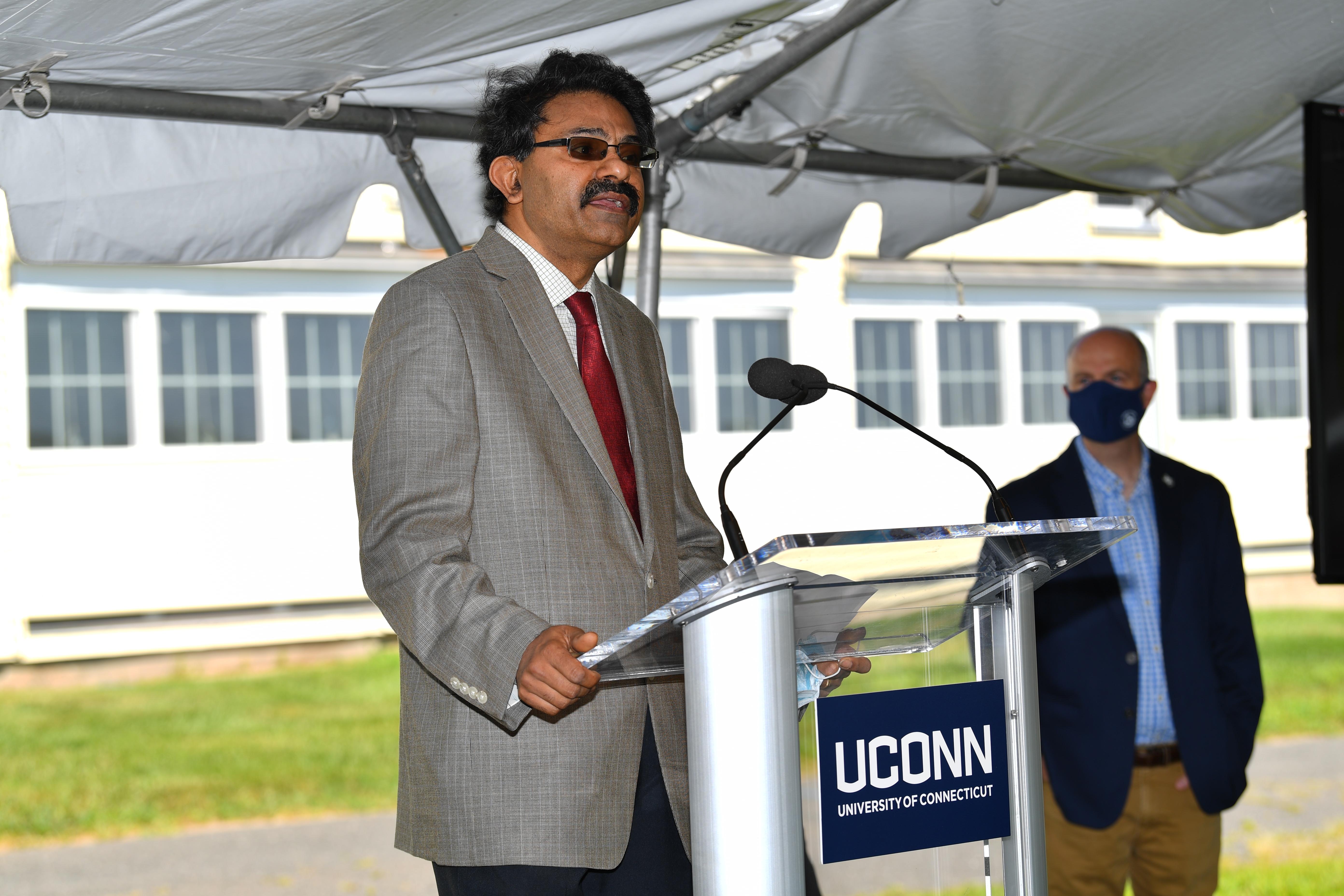The United States Department of Agriculture National Institute of Food and Agriculture (USDA-NIFA) has announced a competitive award of $10 million to a project led by Kumar Venkitanarayanan, UConn College of Agriculture, Health, and Natural Resources Associate Dean of Research and Graduate Education and Professor of Animal Science. The USDA-NIFA funded project is aimed at developing an integrated and sustainable program for enhancing the viability of antibiotic-restricted broiler production in the poultry industry.
The award was announced on Monday, Aug. 3, in a news conference held at the Poultry Unit on Horsebarn Hill attended by Gov. Ned Lamont, UConn President Thomas Katsouleas, lawmakers, and other guests.
The United States produces the most broiler chickens world-wide, topping nine billion birds annually. To maintain such high rates of production, it has been standard to rely on antibiotics to prevent disease, with antimicrobials also promoting faster growth in the birds. However, with concerns surrounding the use of antibiotics, such as the spread of antibiotic resistance, the Food and Drug Administration (FDA) issued a directive to phase out antibiotic growth promoters (AGPs) in poultry production.
Venkitanarayanan explains that this poses challenges for the industry, because maintaining high production while restricting antibiotic use means bird health can be negatively impacted, production can decrease, and there are also environmental concerns due to higher feed consumption, leading to increased waste generation. Big changes need to happen to maintain production without the use of antibiotics.
“Poultry meat is projected to be a major source of protein for the increasing human population, which is projected to be 10 billion by 2050,” says Venkitanarayanan. “The boiler industry has been able to reach high levels of production through selective breeding and by using antibiotics as growth promoters. We are not sure how phasing out antibiotic growth promoters will affect the sustainability of the industry, especially to meet future demand for the increasing population.”
To address these concerns, Venkitanarayanan developed the project in hopes of creating a sustainable broiler production system by improving bird and human health and through addressing environmental concerns. To meet these goals, Venkitanarayanan assembled an interdisciplinary team of 30 researchers from 13 institutions.
“We looked into each component – bird health, human health, and environmental impact of the industry — and we assembled the experts who can address issues in each of the three components,” says Venkitanarayanan. “It is a real collective effort.”
The team includes experts in microbiology, molecular biology, poultry nutritionists, poultry gut health specialists, animal welfare specialists, agricultural engineers, economists, and sociologists.
Venkitanarayanan explains that under each component, the researchers came up with different objectives, starting with bird health.
“From a sustainability perspective, you have to have a focus on chickens and preventing diseases and promoting health. Bird welfare is a major concern. If birds are not healthy, the system will not be sustainable,” he says.
Since antibiotics will not be used, Venkitanarayanan says the researchers will explore new-generation vaccine development to control diseases, the use of novel phytochemicals and probiotics to improve gut health, and new food ingredients, such as insects. This multi-pronged approach is all in the interest in promoting health, preventing disease, and improving feed conversion efficiencies, while hopefully reducing ammonia from the waste generated.
Another strategy within the proposal is in developing monitoring systems and improving living conditions in the buildings that house the birds. Some methods include improved ventilation systems, ways of neutralizing ammonia, and other means to improve air quality.
To address the human health component, the team will be focusing on ways to reduce foodborne pathogens transmitted by meat, as well as monitoring the spread of antibiotic-resistant genes.
“We are going to critically monitor antibiotic resistance spread through the production environment, determining the resistome, or the collection of all bacterial antibiotic resistance genes in a community,” says Venkitanarayanan.
Education is a critical element of the project for both consumers and stakeholders, says Venkitanarayanan. Outreach efforts will be made to inform consumers about the interventions, and also to educate stakeholders on sustainable methods of production. Scientists from other countries that produce large quantities of broilers, India and Mexico, will also be educated on the interventions so they can implement more sustainable production practices as well.
The final component of the project is concerned with reducing the environmental toll that the broiler industry creates by addressing waste, explains Venkitanarayanan. “We have a team where we will increase the value of poultry litter. The litter will be converted into energy production.”
Poultry litter – waste produced by chickens and turkey that includes elements like manure, spilled feed, and bedding – not only creates problems for air quality, but the excess ammonia from the material can acidify soil and add too much nitrogen to the ecosystem.
Cost/benefit analyses of the project will also be done to measure the impacts on the industry and the environment. The project is scheduled to start this September.
For more information about the project, read the USDA release on the project, or read the full project description. Institutions involved in the project besides UConn are the University of Georgia, the University of Arkansas, the University of Mississippi, Prairie View Agricultural and Mechanical University, Iowa state University, the University of Minnesota, Pennsylvania State University, the University of Maryland, the USDA Agricultural Service of Maryland, North Carolina State University, North Carolina Agricultural and Technical State University, and Appalachian State University.



